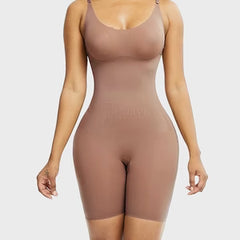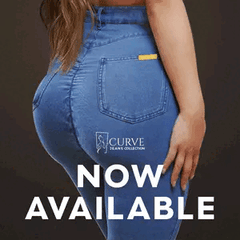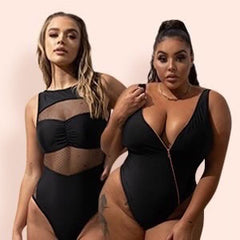HOW TO AVOID SKIN IRRITATIONS CAUSED BY WAIST TRAINERS
Waist Trainer Itching, Rashes & Skin Irritation: Why It Happens & How to Stop It
Is your waist trainer making you itchy, red, or irritated? You’re not alone. Skin reactions are super common when starting waist training — especially if you’re wearing it for hours, sweating, or have sensitive skin. In this guide, we’ll walk you through exactly why it happens, how to fix it, and when to size up or swap your trainer for better results.
We know — the last thing you want when you’re chasing that snatched waist is angry, itchy skin. Let’s break down what’s really happening underneath the hooks and how to calm it fast.
- Waist trainer itchiness is usually caused by heat, friction, or dry skin.
- Back acne is common — especially if you're sweating in it for hours.
- Wearing a cotton layer, moisturizing, and proper sizing can help.
- If it burns, blisters, or lasts more than a few days — take a break.
Is It Normal to Feel Itchy After Wearing a Waist Trainer?
Yes — and it’s super common. Itchiness is one of the most frequent early side effects, especially if you’re wearing your trainer for hours at a time or working out in it. But knowing the cause helps you fix it fast.
Why Does Waist Training Cause Itchiness or Skin Irritation?

Itchiness usually happens after you remove your waist trainer. It’s often due to:
- Sweat and heat buildup: Can clog pores under compression.
- Dry or sensitive skin: Reacts faster to tightness and lack of airflow.
- Friction: Especially if you’re not wearing a cotton layer underneath.
- Back acne or clogged pores: From trapped sweat or bacteria.
Pro tip: Small red bumps or acne from sweat and friction are common with tight workout gear too — not just waist trainers.
Materials & Design: Why Your Waist Trainer’s Fabric Makes a Difference
The fabric touching your skin makes all the difference — especially if you’re sensitive. Here’s a quick breakdown:
- Cotton-lined latex (our design): Soft, breathable cotton on the inside for comfort, natural latex on the outside for strong but flexible compression. Best for daily wear or reactive skin.
- All-latex trainers: Firm compression, but latex directly on skin can trap heat and increase the chance of rashes.
- Neoprene “sweat belts”: Encourage sweating — good for workouts, but not ideal for long wear if you're acne-prone.
Tip: Always check what material touches your skin. Cotton helps your skin breathe — and that matters more than you'd think.
Full bust alert 💡
If you have a larger bust, a standard waist trainer might dig in under the bra line and cause extra redness or irritation. That’s why we designed ours with a gentle curved underbust cut — it gives your bust more space and reduces friction under the chest. You’ll notice it especially if you’re wearing it for longer periods or postpartum.

What’s Normal — and What’s Not?
- ✅ Normal: Light itching, mild redness, temporary marks
- 🚫 Not Normal: Burning, stinging, hives, blistering, or pain
Note: This isn’t medical advice. If symptoms persist or worsen, speak to a dermatologist or GP.
How to Prevent Itching from Waist Trainers
- 🧼 Wash your waist trainer often: Bacteria can build up fast, especially after sweating.
- 🛁 Moisturize post-session: Dry skin reacts more. Keep it hydrated after removing your trainer.
- 👕 Wear a cotton tank underneath: Creates a barrier and reduces friction.
- 🍼 Use baby powder or cornstarch: Absorbs sweat and keeps skin dry.

Skin Reactions: What’s Normal — and What’s Not
It’s completely normal to see light redness, shallow indentations, or gentle pressure marks after removing your waist trainer — especially if you’ve worn it for several hours. These signs usually fade within minutes to an hour and aren’t cause for concern.
However, if your skin shows deeper irritation like swelling, blistering, or raised red patches, this could be a sign your waist trainer is too tight, poorly designed, or made with materials that don’t suit your skin. Persistent discomfort or painful marks aren’t normal and shouldn’t be ignored. Always listen to your body — and if in doubt, take a break and let your skin recover.
What If Your Waist Trainer Suddenly Feels Too Tight?
Sometimes irritation isn’t about skin — it’s about sizing. Here’s when you might notice discomfort:
- You’re bloated (menstrual cycle, food, digestion)
- You’ve gained or lost a little weight
- You’re new and still adjusting to the compression
Your body changes — and that’s okay. Many women keep a second size up for PMS days or early postpartum. It helps you stay consistent without pushing through discomfort.
Not sure about sizing? Use our waist trainer size guide or see our tips on postpartum waist training.

Bonus Tips for Sensitive Skin
- Avoid scented lotions or powders under your trainer — fragrance can irritate.
- Start with short wear times (1–2 hrs) and increase gradually.
- If you’re latex-sensitive, try latex-free options or double up on a cotton tank.
Frequently Asked Questions
Can waist trainers cause rashes?
Yes — especially if your skin is sensitive or sweaty. A rash that lasts more than a few days should be checked by a doctor.
How do I treat skin irritation from a waist trainer?
Cleanse the area gently, apply a soothing moisturizer or aloe vera, and avoid wearing your trainer until the irritation subsides.
Should I stop waist training if I get a rash?
If it’s mild, try adjusting your skincare routine and how you wear it. But if it’s painful or blistering — take a break and speak to a GP.
Cotton-Lined vs Standard Latex Trainers at a Glance
| Feature | Cotton-Lined Latex (Us) | All-Latex |
|---|---|---|
| Skin feel after 4+ hrs | Soft, less sticky | Can feel rubbery |
| Flexibility for movement | High – natural latex stretches with you | High |
| Heat & moisture build-up | Lower (cotton wicks moisture) | Higher |
| Best for sensitive skin | ✔︎ | Depends on skin tolerance |
No material is “better” — it’s about what works for your skin, lifestyle, and training style. If you’re sensitive, cotton lining can make all the difference.
Ready to try a skin-friendlier trainer?
Explore our cotton-lined waist trainer collection — designed to support your goals and your skin. No pressure. Just real comfort for real bodies.





 Our Story
Our Story Blogs
Blogs
0 comments